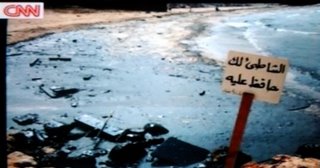
Environment: the latest casualty of war
After 24 days of conflict there is little sign of an imminent ceasefire. There were further airstrikes against Hezbollah targets hit Beirut overnight Thursday. The destruction left in the wake of such bombardments is extensive. Much of Lebanon’s suburbs are in ruins. Roads and infrastructure throughout the south of the country are also destroyed. And besides Israeli efforts to destroy Hezbollah, it appears stronger than ever. Popular support for the terrorist group has increased and Thursday saw a record number of Katyusha rockets fired into Israel. Two hundred rockets hit the Israeli territory and at least 8 civilians were killed. Efforts to kill or capture Hezbollah’s leader have also failed. Israel so far claims to have killed 300 Hezbollah fighters. Channel 4 News reported Wednesday that an attack on a hospital in north-east Lebanon had been an intelligence led effort to dispatch the radical cleric. In fact the man captured had the misfortune of having the same name according to the news channel’s sources. Then on Thursday the Hezbollah leader Sheik Hassan_Nasrallah spoke on al Manar television in which he threatened to attack Tel Aviv should Beirut come under further attacks. The casualties continue to rise on both sides of this war. At least 644 have died in Lebanon, and according to a report in the Independent nearly 50% are children. Shaigsta Aziz, a spokesperson for Oxfam, speaking on Sky News said that over 900,000 civilians had been displaced by the conflict. The continued suffering of the Lebanese civilian population is beginning to gel support for Hezbollah throughout the Muslim world. In Iraq large demonstrations by Shi’ites have been seen in Baghdad. This in a country already torn apart by continuing sectarian fighting. And an Indonesian group has claimed it is sending suicide bombers to Britain and other countries that support Israel. Channel Four News reported that the AMYM’s [the Jakarta-based ASEAN Muslim Youth Movement] chairman Suaib Didu said militants had been trained to carry out suicide bombings to revenge Israel's military strikes on the Palestinian territories and Lebanon. Their claims are often thought to be exaggerated. Israel has lost far fewer civilians, some 41 have been killed by the daily rocket attacks, but the increased military losses [now numbering 27] are beginning to call into question Israel’s military tactics. Several Israeli newspapers have begun to be more openly pessimistic as to the outcome of the conflict. Haaratz in its editorial said, “Over the past weeks, it has become clear that the entire pyramid of government - from the prime minister to the Home Front Command, and including ministry accountants and legal advisers - was unprepared for the massive attack that paralyzed life in the north of the country.” The editorial continued, “It is no longer possible to make do with lofty talk about achievements while Hezbollah is proving that nothing deters it from continuing its attacks on Israel. One of the war's main goals was to prevent missile fire on Israel. This goal has yet to be achieved. This must be said honestly.” The environment is also coming under attack from the bombardments. All along the Lebanese coast a huge oil spill is threatening wildlife. The Environmental News Service reported that 30,000 tonnes of oil had spilled into the Mediterranean sea as a result of the Israeli bombardments of a Lebanese power plant three weeks ago. Paul Mifsud, coordinator of the UN Environmental Programme’s Mediterranean Action Plan, said, “The environmental catastrophe is threatening the Mediterranean region”. Satellite imagery [DLR] from the European’s Joint Research Centre showed the slick had already entered Syrian waters and contaminated 90 km of coastline. The oil-fueled Jiyyeh power plant was hit on 13th and 15th July resulting in a massive fire which burned for days. Meanwhile diplomatic efforts to stop the fighting have not progressed very far. Tony Blair who has been under constant criticism for not calling for a ceasefire by his party has now delayed his Caribbean holiday. Talks continue at the United Nations but there seems to be no end in sight to the hostilities.

No comments:
Post a Comment